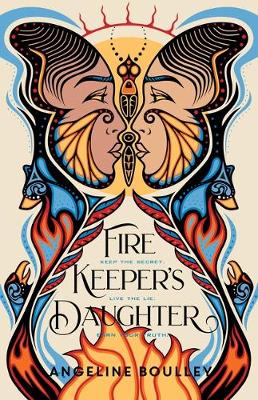Reviewed by nannah on
Fire Keeper’s Daughter is a mystery thriller that, up until the last fourth, focuses much less on suspense and thrill, and much more on its romantic subplot and cultural aspects. Which, depending on your preferences, can be exactly what you want or something you’d rather pass on.
Content warnings:
- rape
- racism
- sexism
- drug abuse
Representation:
- most of the main and secondary characters are indigenous Americans (Ojibwe)
When Daunis Fontaine, a biracial, unenrolled tribal member witnesses the murder of her best friend, she’s cast into an investigation involving her Ojibwe reservation and goes undercover. But soon she starts falling for her fellow undercover agent--whose real name she doesn’t even know--and she begins uncovering truths about people she thought she knew. She went undercover to protect her community, but she begins to see that she and the FBI have different goals. If helping the FBI means tearing her community apart, will it be worth it?
It’s obvious Angeline Boulley loves her people and her culture. It’s expressed on every page and through nearly every one of Daunis’s actions. It’s gorgeous to read. I’m loving how non-English words aren’t italicized in newer published books, too. Boulley also doesn’t include a glossary, and there are many Anishinaabemowin words in the text, but they’re always written in a way that provides enough context clues to understand what they mean and what’s going on.
Though I thought it wasn’t fully developed until the second half, which might seem strange because Daunis witnesses her best friend’s murder in the first, I feel like the theme of grief is handled very well. No, Daunis doesn’t react the way one “expects” her to after her friend is murdered, yes, she seems to “move on” very quickly, romancing it up with the love interest and all that … but it’s all very similar to the way someone I love acted after losing her husband. Grief doesn’t make sense, and it can literally change personalities. Everyone reacts differently to losing someone. But Daunis having nightmares, being able to remember the murderer’s last words only long after the event, and having overpowering scent memories are all elements of PTSD that makes the book so much more real to me. Boulley took so much care in writing this.
Daunis’s relationships with some of the other characters are also one of the book’s other strongest parts, particularly Daunis’s relationship with her Aunt, Teddie; Seeney, one of the elders; and most surprisingly with the other undercover agent, Ron. People may argue with me on that last point, but it's such a refreshing contrast to the romance subplot and the way Daunis and Jamie, the love interest, interact.
But at just over 490 pages, I feel like some of almost everything could be cut. Sometimes the novel would suddenly go on a tangent describing a character or a character’s backstory that would never be mentioned again. In the first half, there was also a mind-boggling amount of repetition for no reason I could understand. I wish I had counted the number of times Daunis goes on runs, then visits her grandmother in the hospital, then showers, etc., and painstakingly describes each moment to the reader.
That, and Daunis’s aggravating relationship with her undercover-FBI love interest, Jamie, nearly made me put the book down. I still don’t understand the appeal of this relationship--and their constant bickering through the first half never struck me as romantic (and this dynamic never did as an actual teen, either. But this is very subjective). Unfortunately, the first half becomes largely devoted to the romance subplot between Daunis and Jamie, so it’s pretty difficult to get through if you absolutely hate it. At the end, though, I very much appreciate what Boulley does with their relationship. It's very rare for YA, and it kicked my rating of the book up a half star.
The other issue I have is with Jamie himself (okay, mostly with his scar--but god, do I find Jamie annoying! He’s the typical YA love interest … mysterious past, hot body wrapped up with that scar to make him stand out a little). But Daunis’s narration always draws attention to his scar. His smile tugs on the end of his scar, she wants to touch his scar, she’s always looking at/watching his scar, etc., until it borderlines fetishization. The worst is this, which happens twice: “Jamie raises the eyebrow on the perfect side of his face.” Just two lines, but they’re devastating.
Ah, almost forgot ... there's a rape scene in the novel that seems unnecessary (does nothing to move the plot/character growth forward)--except to point out the violence against indigenous women, and the lack of justice given for them. I understand wanting to make this point, but I'm not sure this is the best way to go about it.
So there were lots I loved and some I didn’t. Overall I feel that with another edit or two, this could have been a lot stronger. It’s not a bad read, and it might seem like what I didn’t like hardly merits the rating, but I don’t think I could read it again, given its length, the repetitive first half, and the page time spent on Daunis and Jamie’s relationship. I will definitely read what Angeline Boulley writes next, though!
Reading updates
- Started reading
- 6 May, 2022: Finished reading
- 6 May, 2022: Reviewed
